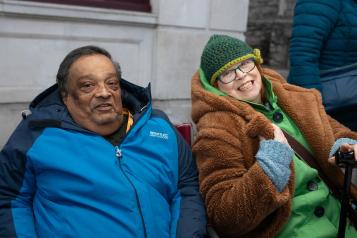Tackling inequalities in health and care

The vision for our updated strategy, which we have launched today, is:
'A world where we can all get the health and care we need'.
Yet, as the COVID-19 pandemic has highlighted, our society has got some way to travel before we achieve this goal.
The past year has brought into stark relief that health and wellbeing are not equal. Factors such as culture, location, wealth, education, environment and discrimination can lead to worse outcomes, and there is a strong consensus that this must change.
Playing our part to end health inequalities
Tackling unequal health outcomes and access to support will need those in power to listen, hear the experiences of those facing inequality, understand and act on the steps that could improve people's lives. At Healthwatch, we stand ready to help by doing more to amplify the voices of communities that go unheard and reduce the barriers they face.
However, as our updated strategy and business plan make clear, this requires Healthwatch England to think about equalities, diversity and inclusion when it comes to every aspect of our work. To continually ask ourselves what more we can do to listen to those the system currently overlooks, address the barriers to participation, and make sure our evidence gets to those with the power to act swiftly.
What have we already done?
In June 2020, the Healthwatch England Committee approved our first annual Equalities, Diversity and Inclusion (EDI) Plan, which took stock of our current approach and pulled together all the activities we already had in-train to promote equalities through our work. We also committed to look at all our work through the lens of equality, diversity and inclusion and to report progress quarterly.
Some of the steps we have taken
- Revamped our Equalities Impact Assessment policy;
- Updated our national feedback form to better identify who is sharing views with us;
- Rolled out guidance to help local Healthwatch engage different sections of the community; and
- Made sure the public can read our online advice and information in other languages.
The first year of our strategy
The COVID-19 pandemic highlighted how pre-existing inequalities have a disproportionate impact on people from ethnic minority communities. We also know from our national work that people from Black and Asian backgrounds are less likely to tell us their experiences of health and care and the issues they face. This is why the first year of strategy, which is being launched during the pandemic, will focus on how we can better engage and support people from ethnic minority backgrounds.
Seeking the views of those who are not heard
With a new strategic objective to 'To seek the views of those who are seldom heard and reduce the barriers they face', we aim to:
- Improve our approach to make more people aware of our service;
- Run a national campaign to increase the proportion of people from ethnic minority backgrounds sharing their experiences with us; and
- Use the evidence we collect to help improve health and care support and hold the system to account.
Putting equalities at the heart of our culture
Our strategic review highlighted the passion our staff and volunteers have for tackling the health inequalities communities face, as well as the engagement best practice that already exists across England. However, we can do more to promote a Healthwatch culture where everyone feels welcome, that their views are valued and that they want to work with and for us to make a difference. Over the next year, we will aim to:
- Ensure local Healthwatch services understand their legal equalities duties and take a consistent approach to champion equalities in their work;
- Encourage local Healthwatch to review the makeup of their boards to ensure a diverse range of perspectives drives their decisions;
- Identify if we are recruiting enough volunteers from diverse backgrounds, if not, what solutions are needed; and
- Improve the skills and confidence of local Healthwatch to engage and support more communities to have their say on care.
Removing the barriers that prevent us from being the best
There are also barriers that we need to address if we are to deliver our strategy successfully. Some are internal, like improving our ability to record when experiences relate to specific communities or the better sharing of engagement expertise between local Healthwatch.
However, other hurdles will require the support of our NHS, local government and third sector partners. With services facing a backlog of care caused by the response to COVID-19 and many communities facing an uncertain economic future, we must do all we can to stop existing health inequalities from becoming worse.
This means pushing for a sharper focus on hearing the views of those the system currently overlooks and making sure their feedback leads to change. It also means making the argument for investing in community engagement at every level of health and care so that everyone can all get the health and care they need.
Find out more
Read more about our updated strategy covering the next five years, as well as what we plan to achieve over the next twelve months.


